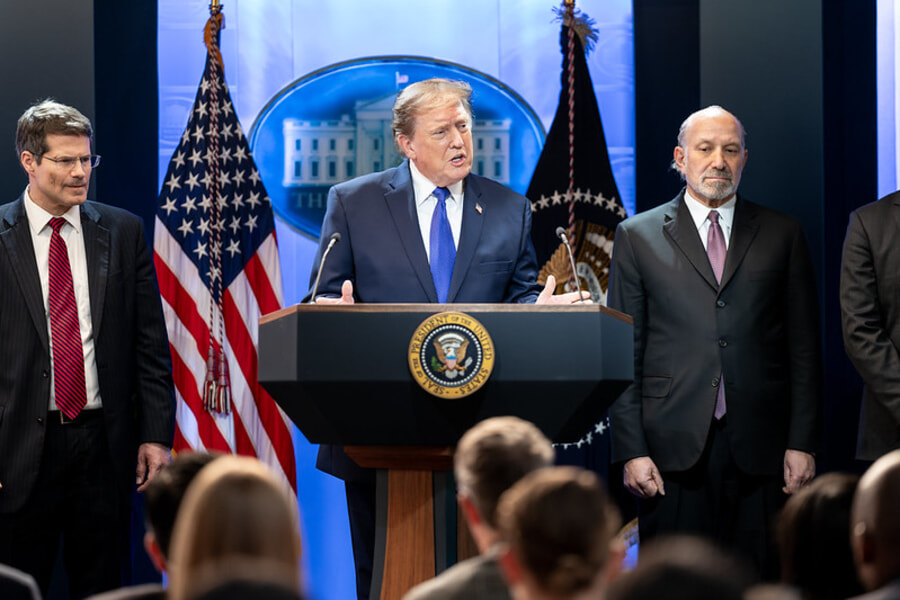The D.C. Circuit Rules on the 9/11 Guilty Pleas—and Says Much More
The 2-1 opinion is a signal—whether intentional or not—that the majority believes the Guantanamo military commissions have failed.

Amid the flurry of recent U.S. Court of Appeals for the D.C. Circuit decisions weighing in on the Trump administration’s unprecedented use of the law in the realms of immigration and executive agencies, the court quietly issued a significant ruling relating to last generation’s unprecedented use of the law: the Guantanamo military commissions.
The creation of the commissions was premised on the aspirational principle that the United States would fight terrorism using the law. And the project was all the vogue in legal circles in the mid-2000s—politicans railed about it, lawyers clamored to get involved, the courts waxed poetic. But it proved complicated, ineffectual, and maddeningly slow. Almost everyone lost interest and abandoned it, eager to make the whole thing someone else’s problem.
Yet these things have a way of resurfacing, particularly when something controversial happens—like when the alleged perpetrators of the Sept. 11, 2001, attacks try to plead guilty. That’s how In re United States arrived on the D.C. Circuit’s doorstep, and why a panel of judges were forced to revisit the 20-year-old experiment that is the Guantanamo military commissions. With its July 11 decision, the court sent a powerful but unspoken message: Two of the three judges believe that experiment has failed.
In 2006, George W. Bush pledged that the Military Commissions Act would “bring justice to the men believed to have planned the attacks of September 11, 2001.” But, he said, the United States would live its values by holding terrorists accountable in accordance with the rule of law: They would be presumed innocent, have access to an attorney, and hear the evidence against them. “We will answer brutal murder with patient justice,” Bush promised. The alleged perpetrators of Sept. 11 were indicted in that system a year and a half later, in May 2008.
As it turns out, “patient” was a bit of an understatement. The 9/11 defendants’ case has been stalled in pretrial proceedings for more than a decade and a half, during which time one of the original defendants has been declared incompetent to stand trial. “Patient justice” has meant a lot of waiting.
But last summer, after nearly 15 years, it seemed the end was in sight. The government announced that three of the 9/11 defendants, including alleged mastermind Khalid Sheikh Mohammed, would plead guilty in exchange for life sentences. Sentencing proceedings would occur as soon as summer 2025. Those proceedings would be a kind of mini-trial; the government would tell its story, the defendants might tell theirs, and any victim or family member would be entitled to make victim impact statements—to tell their own stories. The deals involved a unique term that would require the defendants to answer any questions the victims and their families wished to ask of them. In other words, they’d get the chance to seek closure from the defendants on their own terms, directly, rather than through a prosecutor.
Then, two days later, then-Secretary of Defense Lloyd Austin abruptly canceled the deals.
But the defendants argued that he couldn’t. So … more waiting. Waiting to see whether the military judge would find that the pleas must go forward. (Yes.) Waiting to see whether the Court of Military Commissions Review (CMCR) would agree. (Yes.) And, since January, waiting to see whether the D.C. Circuit would agree as well.
On July 11, in a 2-1 opinion, the court said no. Judges Patricia Millett and Neomi Rao rejected the lower courts’ finding that the plea agreements were binding because the defendants had already begun performance by the time of Austin’s purported withdrawal. It also rejected the defendants’ argument that the D.C. Circuit couldn’t even hear the case because the writ of mandamus the government sought wasn’t legally available. Judge Robert Wilkins dissented.
So now it’s back to the military commission, back to waiting for justice. But even hoping for a resolution, let alone justice, is almost certainly futile in the absence of guilty pleas. It is no exaggeration to say that these cases will never make it to trial. The guilty pleas were the only way to bring an end to the 9/11 proceedings; everyone who has been deeply involved in the case agrees as much. But politicians—and now the D.C. Circuit—keep getting in the way.
To be very clear: I do not believe this is their goal. I do not believe that the judges in the majority are trying to sabotage the plea agreements, or delay the proceedings, or otherwise get in the way of progress. I’m confident that everyone agrees that justice should be served and that closure is past due. But by deciding as it did, the majority all but ensured that the 9/11 case will result in neither justice nor closure. And by deciding how it did, the majority posited that this whole system, built on the aspirational principle that terrorism could be vanquished with the law, has failed.
It began with Austin’s order, which utterly disregarded the very regulations his office was responsible for promulgating. The order simply stated that, first, he was rescinding the authority of his appointee, Brig. Gen. (Ret.) Susan Escallier, with respect to plea agreements in the case and, second, he was withdrawing from the pleas she had executed. It cited no legal authority allowing him to take these actions.
But there is legal authority pertaining to these matters. The Rules for Military Commissions (R.M.C.) contains detailed provisions about the role of the convening authority, which includes the power to enter plea agreements—the power Austin reclaimed from Escallier. It also contains a provision governing withdrawal from plea agreements, including specific requirements where the convening authority (rather than the defendant) wishes to withdraw.
As to the first, there was a straightforward means by which Austin could have taken over for Escallier as convening authority, and it’s spelled out in R.M.C. 601. But he didn’t bother following that rule. As to the second, he didn’t even acknowledge that the regulations limit a convening authority’s ability to withdraw from a plea (in R.M.C. 705(4)(b)). Furthermore, the rule specifically provides for another means by which the convening authority can withdraw from plea agreements, and it’s one that Austin’s rhetoric suggests he would have availed himself of—if the required hearing in which the judge must question the parties revealed that there was a material disagreement as to the terms of the agreement. He and his advisors must have known about this. Plea agreements are a serious matter, especially in the military justice system on which the military commissions are based. In fact, R.M.C. 705(4)(b) is nearly identical to its counterpart in the courts-martial system, which is, conveniently, R.C.M. 705(4)(B). Besides, the secretary of defense is literally in charge of creating the rules applicable in the military commissions. But again, he didn’t bother with the rules.
The military judge in the case, however, averred that the rules do matter. Even when they bind the secretary of defense; even when the outcome is politically inconvenient. He ruled that Austin did not have the power to remove Escallier’s authority in the way he had and, further, that the convening authority could not withdraw from the plea—not because it was Austin, but because R.M.C. 705 did not permit withdrawal under the circumstances. The military commissions appellate court, the Court of Military Commissions Review (CMCR), didn’t agree that Austin lacked the power to reclaim Escallier’s authority, but it did agree that R.M.C. 705(4)(b) prohibited him from withdrawing from the pleas.
Enter the D.C. Circuit. Unlike Austin, the court didn’t flatly ignore existing law around the military commissions—but the majority was pretty dismissive of it.
The opinion’s analysis began with the threshold question of whether the court could even hear the case. The Military Commissions Act provides that direct appeals to Article III courts are not allowed until after final judgment, so the government had styled its claims as a petition for a writ of mandamus. To consider the merits of the case, then, the court would first have to decide whether the government met the “exacting standard” for mandamus—that is, that the government proved that (1) its right to immediate relief was “clear and indisputable”; (2) it had “no other adequate means to attain the relief” it sought; and (3) the writ was appropriate under the circumstances.
In a move that dissenting Judge Wilkins called “stunning” and a “grave error,” the majority held that mandamus was proper. It went on to hold that Austin had possessed the authority to take over convening authority powers (a conclusion with which Wilkins concurred) and that the pleas had not been binding because the defendants had not begun performance (a conclusion with which Wilkins disagreed, as had the trial and appellate courts in the military commissions system).
There is much to unpack in the opinion, but perhaps most remarkable is the court’s treatment of what one might call the law of military commissions. That law is, by any account, incredibly complex. The commissions were built from scratch in 2006 as a response to the dilemma at Guantanamo: The U.S. had captured hundreds of alleged terrorists, was holding them pursuant to war-related detention authority, and wanted to hold at least some of them criminally accountable. The commissions are a hybrid Article II-Article I court, created by statute, operated and regulated by the executive branch, and shaped by intermittent federal court rulings on issues of constitutionality (including a Supreme Court ruling in 2008 that required Congress to overhaul the legislation establishing them). The commissions are modeled after courts-martial, a military system of law and procedure that operates mostly independently from Article III federal courts and other civilian courts. They have jurisdiction over crimes set forth by statute, but which must have a basis in international law of armed conflict (which is why, in 2014, the D.C. Circuit held that the Military Commissions Act’s criminalization of material support for terrorism was invalid).
It’s useful to keep that backdrop in mind in considering the majority’s mandamus analysis. In 2016, when a different Guantanamo defendant, Abd al-Rahim al-Nashiri, brought a case arguing that the charges against him were unlawful, the D.C. Circuit refused to even hear the matter. The court must abstain from considering his challenge, the majority said, because federal courts cannot interfere with a “specialized” tribunal like the military commissions any earlier than Congress dictated. The dissent, by contrast, argued that the military commissions’ “absence of a well-developed body of law” militated against abstention.
Nearly 10 years later, that logic is inverted. The majority apparently felt no compunction about interfering with a specialized tribunal, notwithstanding the additional decade of development in the commissions’ “body of law.”
As a threshold matter, it’s curious that the majority justified its grant of mandamus partially on the grounds that it must weigh in on the question of whether Austin had the legal authority to revoke Escallier’s powers as convening authority and withdraw from the pleas. As the majority itself notes, that’s exactly what the CMCR had held; that was already the law of the case. If on remand the military judge had ignored that judgment, the government would have had the opportunity to again petition the CMCR to enforce it. It’s not only that the question of Austin’s authority was not properly before the court. The government did not demonstrably need relief on that question, and even if it later would, the proper procedure was to go to the CMCR. That flatly defeats the “no alternative means” prong of mandamus. The majority effectively gave an advisory opinion on the question of Austin’s authority—suggesting that it did not trust the legal system in which the question had been raised and resolved.
Similarly, the court stepped far beyond its typical role of relying on the record below even on questions requiring de novo review. The judges spent a tremendous amount of time at oral argument inquiring about hearing transcripts and other materials, and then issued two separate requests for supplemental materials after the argument. Even de novo review on appeal does not usually result in the court taking on the role of fact-finder. It seemed to suggest that the majority did not trust the proceedings in the commissions. (Incidentally, Wilkins wrote that as to certain parts of the analysis, de novo was the wrong standard of review.)
The majority’s treatment of the issue of performance is also illustrative. It focused in particular on the question of whether the defendants’ signing of stipulations of fact was tantamount to beginning performance (if so, the plea agreements were binding and Austin could not have validly withdrawn from them). The majority found no performance had begun and that the military judge’s finding to the contrary was “clear and indisputable error given the ordinary meaning of the withdrawal regulation’s text, basic principles of contract law, and the text of the pretrial [plea] agreements.” It barely acknowledged, however, that the nation’s highest military court had held exactly that: Entering into stipulations in conjunction with signing a plea agreement was, pursuant to an identically worded withdrawal regulation, beginning performance. That decision, United States v. Dean, was issued in early 2009. Had Congress preferred it otherwise, it could have changed the rules in its 2009 overhaul of the military commissions. Had any of the more than half-dozen secretaries of defense since then wanted a different rule for the military commissions, they had full authority to make the change. Had any of the prosecutors and convening authorities negotiating the pleas with the 9/11 defendants over the years been concerned about that rule, they could have demanded terms in the agreements to change them. Those lawyers—who are, as required by statute, seasoned military lawyers who have probably negotiated many plea agreements in their careers—were unquestionably familiar with Dean. And the same must be true for the many legal advisers to secretaries of defense over the past 17 years.
In a footnote, the majority of the D.C. Circuit panel “decline[d] to follow Dean” because the military’s highest court “did not explain how its holding was consistent with the text of the withdrawal regulation or basic principles of contract law.” The majority correctly noted that Dean is not legally binding (though it omitted the fact that military law decisions have been invariably treated as highly persuasive as pertains to the commissions). But the central question on mandamus is whether the military judge’s ruling was so incontrovertibly incorrect that the government is “clearly and indisputably” entitled to relief. By granting mandamus, the majority asserted that two specialized military courts’ adherence to prominent, well-established legal precedent was not only wrong, but so wrong that extraordinary relief was warranted. What has changed since 2016, when this same court expressed the need for deference to “military expertise” in the military commissions and approved its review structure “because it is virtually identical” to the courts-martial system? The majority didn’t say.
Instead, it turned to the law of contracts, relying heavily on contracts treatises that one might find in a first-year law student’s casebook. The analysis treated the plea agreements as though they were novel arrangements requiring a return to first principles. But they are decidedly not novel, at least when considered in context. Eight defendants have already executed plea agreements in the military commissions. (Disclosure: I was an attorney for one of them, Majid Khan.) That may not seem like much, but recall that only 32 people have ever been charged in the commissions, 12 of those cases were dismissed, and only 10 have been resolved—in other words, 80 percent of commissions cases that have been resolved have ended in guilty pleas. That’s to say nothing of the courts-martial system against which these pleas were negotiated, which used an essentially identical withdrawal regulation and, like the civilian criminal justice system, resolves the vast majority of criminal cases through guilty pleas. The majority shrugs off this body of law in favor of an academic interpretation of contracts law. The effect is not only “doubly disrespect[ful] of the work of two military courts,” as Wilkins wrote in his dissent, it also ignores the body of law in which every preceding actor had operated and pursuant to which the judges had ruled. That, in turn, allows the majority to conclude that mandamus is proper.
But by doing so, the majority—purposefully or not—issued an opinion on a much broader matter. It is fundamentally a vote of no confidence. The grant of mandamus implies that the court must provide emergency supervision of a system that cannot be trusted. The disregard for the commissions’ body of law developed over the past nearly two decades is more evidence of distrust, or perhaps disapproval of the very notion that a body of law can exist in a specialized tribunal. Contracts law treatises must take precedence over clearly established military law precedent. No matter that every party involved in the 9/11 pleas—prosecutors, defendants, and convening authority—had concluded that the only hope for lawful resolution was through guilty pleas. No matter that the system had already resolved eight other cases through pleas that had been ratified by multiple military commissions judges.
The conscious or unconscious subtext of the opinion, in other words, is that the majority has reached an unavoidable conclusion. The military commissions system is inadequate to the task for which it was created and the task for which it has been repeatedly propped up by all three branches of government for nearly two decades: holding terrorists to account using the rule of law. The experiment, the majority suggests, has failed.


.jpg?sfvrsn=3792d97a_5)


